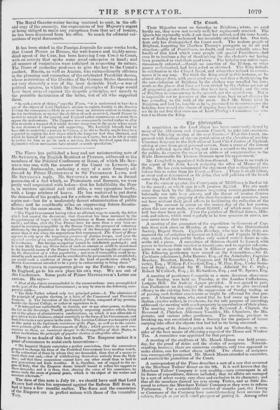The Times has published a long and not uninteresting note
of Mr. SEYMOUR, the English Resident at Florence, addressed to the members of the Political Conference at Rome, of which Mr. SEY- MOUR was one, with the answer of the Count DE LUTZOW, the Austrian Ambassador, enclosing a copy of a note formerly ad- dressed by Prince METTERNICH to Sir FREDERICK LAMB, and Mr. SEYMOUR'S reply. Mr. SEYMOUR'S note puts us in formal possession of a fact which, as Protestants and freemen, we wore pretty well acquainted with before—that his Infallibility the Pope is, in matters spiritual and civil alike, a very egregious booby, with a large mixture of knave. He has contrived to put down the demands of his people, not for a reform—to that their thoughts aspire not—but for a moderately decent administration of public affairs; and he confidently relies on suppressing future dissatis- faction by the same means. Mr. SEYMOUR says- " The Papal Government having taken no effectual steps to remedy the defect which had created the discontent, that discontent has been increased by the disappointment of hopes which the negotiations at Rome were calculated to excite ; and thus, after the Five Powers have for more than a year been oc- cupied in restoring tranquillity in the Roman States, the prospect of voluntary obedience by the population to the authority of the Sovereign seems not to be nearer than it was when the negotiations first commenced. The Court of Rome appears to rely upon the temporary presence of foreign troops, and upon the expected service of an auxiliary Swiss force, fur the maintenance of order in its territories. But foreign occupation cannot be indefinitely prolonged ; and it is not likely that any Swiss force of such an amount as could he maintained by the financial means of the Roman Government could be capable of suppress- ing the discontent of a whole population ; and even if tranquillity could be re- stored by such means, it could not he considered to be permanently re-established ; nor would such a condition of things be the kind of pacification which the British Government intended to be a party in endeavouring to bring about."
Mr. SEYMOUR in consequence gives up the Father; who may, for England, go to his own place his own way. We are out of this Conference. Some parts of Prince METTERNICH'S Letter are curious. He says-
" Most of the objects recommended in the memorandums were accomplished on the part of the Pontifical Government ; as may be seen in the following com- parative table- " The Holy Father refused only two principal points—I. The admission of the principle of popular election, as a basis of the Communal and Provincial Councils. 2. The formation of the Council of State, composed of lay persons, besides the Sacred College,. or rather in opposition to it. " It belonged not undoubtedly to Austria, nor to any other power, to dictate the law to the Sovereign Pontiff, particularly respecting matters which, being out of the sphere of administrative ameliorations, on which it was allowable to give advize to his Holiness, related essentially to the form of his Government, and tended to create a newpower in the state. The Austrian Cabinet was bound to yield on this point to the legitimate resistance of the Pope, as well as to the unani- mous protests of the other Governments of Italy ; which perceive in such con- cessions as these, an imminent danger to the tranquillity of their States, to whose institutions the principle of popular election is altogether alien."
There is no doubt of this last truth. The Emperor makes it a point of conscience to resist such innovations-
" His Imperial Majesty entertains a perfect conviction, that the concessions proposed to change the form of the Pontifical Government have no other worth, in the estimation of those by whom they are demanded, than that of a means to reach their real end,—that of withdrawing themselves entirely from the Holy See; and that these concessions cannot have any other result than to lead to new pretensions and fresh troubles. It is, therefore, out of regard to the re- pose of Italy, that the Emperor deems himself bound to refuse his support to these demands; and it is thus, that, obeying the voice of his conscience, he serves truly the cause of general peace, which is the object of his wishes and constant solicitude."
The date of this note is July 28 . we should have said that Lord ELDON had stolen his argument against the Reform Bill from it, had it been a few months earlier. The .fears and the conscience
of the Emperor are in perfect unison with those of the venerable Toty.


























 Previous page
Previous page